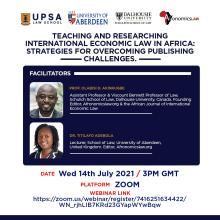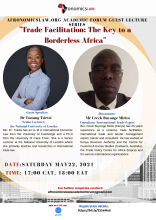Reflections on Day 2 of the AfIELN Biennial Conference: Covid-19 and International Economic Law: Africa’s Experiences and Responses
It is apparent that the issue of private creditors in relation to African sovereign debt is a ticking timing bomb in Africa. Africa, though rich in minerals, has slow economic growth and a serious debt problem. There is thus a need for a harmonised legal framework that deals with the issue of sovereign debt, set a limit on debt levels, and outlines how debt restructuring should occur. Africa cannot afford to wait for the active buy-in of other multilateral players in order to develop this legal framework; Africa needs to drive this initiative. In addition, both players—being African countries and private creditors—must take responsibility to avoid reckless lending. This can also be addressed in a much-needed comprehensive legal framework.


